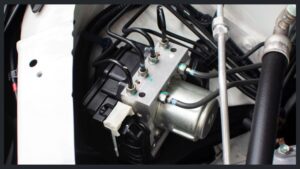
5 Symptoms of a Bad ABS Control Module
Anti-lock brake system control module, also known as the ABS control module, prevents the wheels from locking up while you are moving. This is especially important when you need to brake suddenly to avoid an accident or collision.
How ABS works
When you apply the brakes, the brake calipers press the brake pads against the brake disc. If this clamping force exceeds the available traction between the ground and the tire, the tire will actually stop rotating. This is called brake lock. When you brake suddenly, one or more of your tires can lock up, causing a skid. Skidding increases the likelihood of losing control of your vehicle and significantly increases stopping distances because a rolling tire has more grip than a skidding tire.
The ABS system limits tire skid by using wheel speed sensors to sense the speed of each tire. When your vehicle brakes, if one tire is rotating significantly slower than the other, the brake caliper on that wheel will release very briefly to allow the tire to regain grip. The ABS module then applies the brakes to this wheel again. This process is repeated several times per second as long as the tire loses grip during braking.
The ABS system gives the vehicle much better braking control. Braking distances are significantly reduced, making it easier for everyday drivers to stop as quickly and reliably as possible. You still have some control over the vehicle’s steering during emergency braking. NOTE: Even if your vehicle is equipped with ABS, it is generally not a good idea to brake and steer at the same time. Braking shifts the weight of the car forward, making the rear of the car very light. Trying to steer with the taillights on can easily cause the car to skid. Always brake in a straight line, if possible.
Common Symptoms of a Bad ABS Control Module
The ABS control module ensures that you drive safely and securely on the road. If your control module is faulty and you have to stop suddenly, it can be a horrible awakening.
Below are some of the most common symptoms that indicate a faulty ABS control module. If you notice this, go to a mechanic immediately and have the module replaced.
1) Blocked brakes
The only purpose of the ABS control module is to prevent the wheels from locking up. If you notice your wheels locking up while driving, it clearly means that your ABS control module has failed or been damaged. If your ABS module fails, you usually won’t notice it until you step on the brakes. In other words, you usually won’t notice the problem until you need the system the most.
If your tires are smoking or constantly locking up, you should check to see if your brake calipers are sticking.
2) The ABS light comes on
If your car is newer, you should have an ABS light on your dashboard. If your ABS control module is faulty, you’ll see this light on your dashboard. The light will likely be amber in color, making it easy to spot.
Some ABS systems may still function when the ABS light is on. However, you will need to read the ABS codes to diagnose and repair the problem. ABS systems have layers of redundancy and can experience component or circuit failures.
3) Brake pedal is unresponsive
If your car doesn’t slow down as usual when you place your foot on the brake pedal, this is a clear sign that there is a problem.
At first, the symptoms will appear gradually, requiring you to press the pedal a few times. Over time, however, you will need to press it more frequently to perform a single braking function. Eventually, you may reach a point where it stops working altogether.
If you notice a problem with your brake pedal, you should also check your brake fluid levels and consider flushing your brake system to ensure there is no air in the brake lines.
4) Increased brake pedal force
Your car’s brake pedal may still work, but you have to apply much more pressure to perform simple braking functions.
The brake pedal shouldn’t require as much force. A light press of your foot on the brake pedal should be enough to apply the brakes. If this requires more force, your ABS control module may be faulty.
5) Speedometer doesn’t work
In rare cases, if the ABS control module doesn’t work, the speedometer in your instrument cluster will also stop working. It might show the wrong speed, or the needle might simply stop at 0 mph.
This would usually bring up the ABS or check engine light. But even if no light comes on, a faulty speedometer should be reason enough to have your car checked by a professional.

